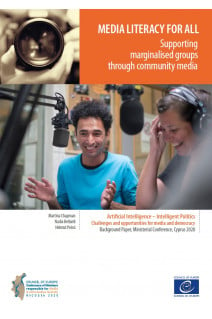Being media literate means being able to critically understand and evaluate media content and to responsibly and safely use digital media services. Media literacy helps us engage with others in the public sphere, using the creative and participatory potential that new technologies and services can offer. Nowadays, it also includes understanding how data is used and how algorithms and AI can influence media production and choices.
The importance of community media in supporting the formation of an ‘informed citizenry’ is well recognised by the Council of Europe. Community media have the ability to empower community groups with the necessary access and skills to create their own communication channels and to foster their participation in the public sphere in a structured and professional manner. However, in many European countries community media still lack formal, legal recognition, fair access to distribution platforms and sustainable funding.
This background paper explores how the community media sector promotes media literacy and how this work can strengthen marginalised communities’ participation in the media environment and public discourse. Comparing five models of community media from Cyprus, Ireland, Luxembourg, Spain and the United Kingdom, it seeks to inform and inspire practitioners and policy-makers, highlighting a number of findings and policy responses that can help member States fully realise the potential of community media.
Artificial Intelligence – Intelligent Politics
Challenges and opportunities for media and democracy
Background Paper, Ministerial Conference, Cyprus 2020
EXECUTIVE SUMMARY METHODOLOGY
Quantitative Data Collection
Qualitative Data Collection
Subjectivity and data verification
INTRODUCTIONBACKGROUND TO THE TOPIC
Media Pluralism
Media Literacy
Community media
IDENTIFYING THE CHALLENGES A COMPARATIVE ANALYSIS OF FIVE MODELS OF COMMUNITY MEDIA AN ANALYSIS OF THE ‘PROMISING PRACTICE’ EXAMPLES OF MEDIA LITERACY PROJECTS WHICH HAVE CONTRIBUTED TO STRENGTHENING MARGINALISED COMMUNITIES’ PARTICIPATION IN COMMUNITY MEDIA
Overview of promising practices
Summaries of promising practices
Common challenges
CONCLUSIONS WITH PROPOSALS FOR ACTION POSSIBLE POLICY RESPONSES FOR MEMBER STATES REFERENCES




